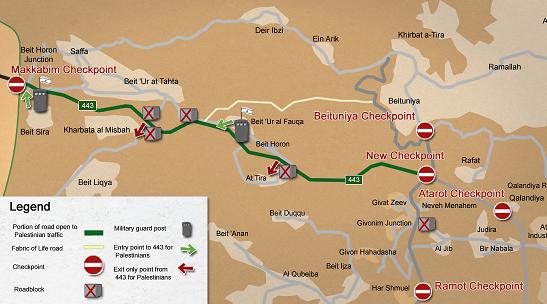The following statement was released at a media briefing organized by ACRI on May 25, 2010, at Saffa, West Bank:
Route 443, which connects northern Jerusalem to Modi’in, Tel Aviv and the coastal plain via the occupied West Bank, has been closed to Palestinian traffic – illegally – since 2002. In December 2009, in a landmark ruling on an ACRI petition (HCJ 2150/07), Israel’s High Court acknowledged the illegality of the closure and ordered the IDF to open the road to Palestinians by May 28, 2010.
The case of Route 443 represents a watershed moment in the legal history of the Israeli occupation of the West Bank. The road was built on land expropriated by the Israeli military in the 1980s. A Supreme Court petition submitted at the time by local residents against the expropriation was rejected; the Court accepted the State’s claim that the road was intended primarily for the benefit of the local Palestinian population, making the expropriation of the land legal according to international law. However, the assumption that the land was built for the benefit of the Palestinian population makes the illegality of the closure even more brazen.
While the Court’s 2009 decision to open the road was originally perceived as a victory for the rule of law and human rights, the IDF’s implementation plan amounts to a blatant mockery of these values. The plan also demonstrates how problematic and insufficient the Court’s ruling is. The new arrangement, which calls for only two entry ramps and four exit points, creates the false impression of new regulations, genuine freedom of movement, and adherence to the rule of law, though in fact no real change will occur; the Palestinians’ situation will actually only worsen.
Map of planned “opening” of Route 443:
Click on photo for detail and right-click to download.
ACRI holds both the IDF and the High Court responsible for what will become a human rights travesty. While the IDF is taking care to adhere to the letter of the law in the Court’s decision, it is acting in utter disregard of the spirit of the ruling which deemed the closing of Route 443 illegal and unacceptable. Rather than redressing the gross injustice committed over the past decade, the IDF continues to exploit every possible loophole to maintain the status quo.
The High Court of Justice, unfortunately, supplied the IDF with a number of such loopholes. The ruling contains an untenable gap between lofty principles and concrete instructions for the military. While the justices underscored the need to protect the Palestinians’ human rights, they chose not to state which roadblocks must be removed, or what steps the army must take in order to fulfill its legal obligations to the local population. Moreover, the Court did not call for the opening of the Beituniya crossing, which connects the Palestinian villages to the metropolitan center of Ramallah. This renders the opening of the road almost meaningless and negates the central principle of the Court’s ruling; without the opening of the Beituniya crossing, Route 443 effectively cannot be used by the very population for which it was built.
Through the 443 ruling and implementation plan, the Israeli authorities are creating an illusion of justice while continuing to violate the Palestinians’ rights and mock the principle of rule of law.
ACRI calls on the Israeli authorities to open all entrance and exit points to Palestinians as was the case prior to 2000, and to allow Palestinians access to Ramallah through the Beituniya crossing in accordance with the original plan for the expansion of Route 443 as well as the High Court ruling from that era.
At the same media briefing, the heads of the Palestinian villages adjacent to Route 443 strongly condemned the IDF’s plan to “open” the road to Palestinian traffic. They specifically cited the continued blockage to Palestinian traffic of the Beituniya crossing, which connects the villages to Ramallah, and the addition of new checkpoints, which render the “opening” of the road worthless.
Resources:
Fact Sheet and Chronology (English) on Route 443
The High Court’s Synopsis of the Ruling (English)
High Court ruling, December 29, 2009 (Hebrew)
ACRI’s petition against the closure of Route 443 to Palestinians, March 2007
ACRI Internet Campaign and Game: 443, How Democratic are We?








